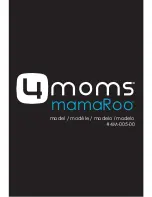
Order No. 2104 ..
4.2.4.4.5 Temperature setpoints
Setpoint temperature presetting
Temperature setpoints can be preset for each operating mode in the ETS as part of first
configuration. It is possible to configure the setpoints for the "Comfort", "Standby" and "Night"
modes directly (absolute setpoint presetting) or relatively (derivation from basic setpoint). The
setpoint temperatures can later be adapted during regular operation if desired, controlled by the
KNX communication objects.
i
The "Frost/heat protection" operating mode allows the separate configuration of two
temperature setpoints for heating (frost protection) and cooling (heat protection) solely in
the ETS. These temperature values cannot be changed later during controller operation.
The "Setpoint presetting" parameter on the parameter page "Room temperature control ->
Controller general -> Setpoints" defines the way the setpoint temperature is preset...
-
"Relative (setpoint temperatures from basic setpoint)" setting:
When presetting the set-temperatures for comfort, standby and night mode, attention has
to be paid to the fact that all setpoints depend on each other as all values are derived from
the basic temperature (basic setpoint). The "Basic temperature after reset" parameter in the
"Room temperature control -> Controller general -> Setpoints" parameter page determines
the basic setpoint, which is loaded when the device is programmed via the ETS. Taking
into account the "Reduce / increase the setpoint temperature in standby mode" or "Reduce
/ increase the setpoint temperature in night mode" parameters the temperature setpoints
for the standby and night mode are derived from this value depending on the heating or
cooling operating mode. The deadband will be additionally considered for the "Heating and
cooling" operating mode.
The 2-byte object "Basic setpoint" provides the option of changing the basic temperature,
and thus all the dependent setpoint temperatures during device operation. A change via the
object must always be enabled in the ETS by configuring the parameter "Change the basic
temperature setpoint via bus" to "Approve". If the basic setpoint adjustment via the bus is
disabled, the "Basic setpoint" object will be hidden. The controller rounds the temperature
values received via the object to the configured interval of the basic setpoint shift
(0.1 K or 0.5 K).
-
"Absolute (independent setpoint temperatures)" setting
The setpoint temperatures for comfort, standby and night mode are independent of each
other. Depending on the operating mode and heating/cooling mode, various temperature
values can be specified in the ETS within the range +7.0 °C to +40.0 °C. The ETS plug-in
does not validate the temperature values. It is thus possible, for example, to select smaller
setpoint temperatures for cooling mode than for heating mode, or to specify lower
temperatures for comfort mode than for standby mode.
After commissioning using the ETS the setpoint temperatures can be changed via the bus
by means of temperature telegrams. This can be done using the communication object
"Setpoint active operating mode". When the controller receives a telegram via this object, it
immediately sets the received temperature as the new setpoint of the active operating
mode, and operates from then on with this setpoint. In this manner it is possible to adapt
the setpoint temperatures of all operating modes separately for eating and cooling mode.
The frost or heat protection temperature programmed in using the ETS cannot be changed
in this manner.
i
With absolute setpoint presetting there is no basic setpoint and also no deadband in the
mixed operating mode "Heating and cooling" (if necessary also with additional level).
Consequently, the room temperature controller cannot control the switchover of the
operating mode automatically, which is why, in this configuration, the setting for the
parameter "Switchover between heating and cooling" is fixed in the ETS to "Via object".
Furthermore, setpoint shifting does not exist for absolute setpoint presetting.
The temperature setpoints programmed in the room temperature controller by the ETS during
commissioning can be changed via communication objects. In the ETS the parameter
Page 87 of 171
Software "KNX CO2 sensor"
Functional description
















































